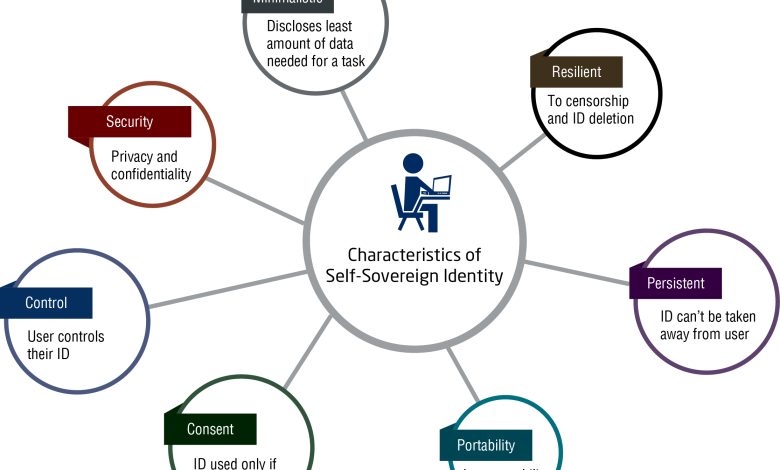The Role of Blockchain in Digital Identity Verification

- Understanding the Basics of Blockchain Technology
- The Importance of Digital Identity Verification in the Digital Age
- How Blockchain Ensures Security and Privacy in Identity Verification
- Challenges and Opportunities in Implementing Blockchain for Identity Verification
- Exploring the Potential Applications of Blockchain in Identity Verification
- The Future of Digital Identity Verification: A Blockchain Perspective
Understanding the Basics of Blockchain Technology
Blockchain technology is a decentralized, distributed ledger system that securely records transactions across a network of computers. Each block in the chain contains a list of transactions, and once a block is added to the chain, it cannot be altered. This immutability and transparency make blockchain a reliable technology for various applications, including digital identity verification.
One of the key features of blockchain technology is its ability to provide a secure and tamper-proof way to verify digital identities. By storing identity information on a blockchain, individuals can have more control over their personal data and who has access to it. This can help prevent identity theft and fraud, as well as streamline the verification process for various online services.
Blockchain technology uses cryptographic algorithms to ensure the security and integrity of the data stored on the network. Each block is linked to the previous one using a unique hash, creating a chain of blocks that is resistant to tampering. This makes it nearly impossible for hackers to alter the data stored on the blockchain, providing a high level of security for digital identity verification.
In addition to security, blockchain technology also offers increased efficiency and transparency in the verification process. By eliminating the need for intermediaries and central authorities, blockchain can streamline identity verification processes and reduce the time and cost associated with verifying identities. This can be especially beneficial in industries such as finance, healthcare, and government, where identity verification is crucial for compliance and security purposes.
Overall, blockchain technology has the potential to revolutionize the way digital identities are verified and managed. Its decentralized nature, security features, and efficiency make it an ideal solution for ensuring the integrity and security of personal data in an increasingly digital world. By understanding the basics of blockchain technology, individuals and organizations can harness its power to improve the way identities are verified and protected online.
The Importance of Digital Identity Verification in the Digital Age
In today’s digital age, the importance of digital identity verification cannot be overstated. With the increasing prevalence of online transactions and interactions, ensuring the security and authenticity of individuals’ identities is crucial. Blockchain technology has emerged as a powerful tool in this regard, offering a secure and decentralized way to verify identities.
One of the key benefits of using blockchain for digital identity verification is its immutability. Once information is recorded on a blockchain, it cannot be altered or tampered with, providing a high level of security and trust. This makes blockchain an ideal solution for verifying identities in a digital environment where fraud and identity theft are prevalent.
Another advantage of blockchain-based identity verification is its transparency. All transactions on a blockchain are visible to all participants, creating a transparent and auditable record of identity verification processes. This transparency helps to build trust among users and reduces the risk of fraudulent activities.
Furthermore, blockchain technology allows for the creation of self-sovereign identities, where individuals have full control over their own identity information. This empowers users to selectively disclose their identity attributes as needed, enhancing privacy and security in online interactions.
Overall, the role of blockchain in digital identity verification is becoming increasingly important in today’s digital age. By leveraging the security, transparency, and self-sovereignty of blockchain technology, organizations can enhance the trust and security of their digital identity verification processes. As the digital landscape continues to evolve, blockchain is poised to play a central role in shaping the future of digital identity verification.
How Blockchain Ensures Security and Privacy in Identity Verification
Blockchain technology plays a crucial role in ensuring security and privacy in digital identity verification processes. By leveraging its decentralized and immutable nature, blockchain provides a secure and transparent way to verify identities without compromising sensitive information.
One of the key ways blockchain enhances security in identity verification is through the use of cryptographic algorithms. These algorithms encrypt data, making it virtually impossible for unauthorized parties to access or tamper with personal information. This ensures that identities are protected from fraud and unauthorized access.
Additionally, blockchain’s decentralized nature eliminates the need for a central authority to verify identities, reducing the risk of a single point of failure. This distributed approach enhances security by spreading verification tasks across multiple nodes, making it more difficult for malicious actors to manipulate the system.
Furthermore, blockchain’s immutability ensures that once identity information is recorded on the blockchain, it cannot be altered or deleted. This feature provides a high level of data integrity, giving users confidence that their personal information is secure and accurate.
Overall, blockchain technology offers a robust solution for ensuring security and privacy in digital identity verification processes. By leveraging its cryptographic algorithms, decentralized structure, and immutability, blockchain provides a secure and transparent way to verify identities while protecting sensitive information from unauthorized access and tampering.
Challenges and Opportunities in Implementing Blockchain for Identity Verification
Implementing blockchain for identity verification presents both challenges and opportunities in the digital landscape. One of the main challenges is the scalability of blockchain technology, as the verification process requires a significant amount of computational power. This can lead to slower verification times and higher costs for users.
Another challenge is the issue of privacy and data protection. While blockchain offers a secure and transparent way to verify identities, it also raises concerns about the storage and sharing of personal information. Ensuring that user data is protected and only accessible to authorized parties is crucial in maintaining trust in the system.
On the other hand, blockchain technology also presents opportunities for improving identity verification processes. By using a decentralized and immutable ledger, blockchain can help reduce fraud and identity theft. This is achieved through the use of cryptographic algorithms that ensure the integrity of the data stored on the blockchain.
Furthermore, blockchain can enable self-sovereign identities, where individuals have full control over their personal information. This empowers users to selectively disclose their identity attributes without relying on centralized authorities. It also streamlines the verification process by eliminating the need for multiple identity checks.
In conclusion, while there are challenges to overcome in implementing blockchain for identity verification, the opportunities it presents for enhancing security and privacy are significant. By addressing scalability issues and ensuring robust data protection measures, blockchain has the potential to revolutionize the way digital identities are verified in the future.
Exploring the Potential Applications of Blockchain in Identity Verification
Blockchain technology has the potential to revolutionize the way identity verification is conducted in various industries. By leveraging the decentralized and immutable nature of blockchain, organizations can enhance security, privacy, and efficiency in verifying individuals’ identities.
One of the key applications of blockchain in identity verification is the creation of self-sovereign identities. This concept allows individuals to have full control over their personal information and selectively share it with third parties. By storing identity data on a blockchain network, users can eliminate the need for centralized identity verification authorities, reducing the risk of data breaches and identity theft.
Another potential application of blockchain in identity verification is the verification of credentials and qualifications. By storing educational degrees, professional certifications, and other credentials on a blockchain, individuals can easily prove their qualifications to potential employers or service providers. This can streamline the hiring process and reduce the risk of credential fraud.
Blockchain technology can also be used to streamline Know Your Customer (KYC) and Anti-Money Laundering (AML) processes in industries such as banking and finance. By creating a shared ledger of verified customer identities, financial institutions can reduce the time and cost associated with verifying customers’ identities while maintaining compliance with regulatory requirements.
Overall, the potential applications of blockchain in identity verification are vast and promising. By leveraging the security, transparency, and decentralization of blockchain technology, organizations can enhance trust, privacy, and efficiency in verifying individuals’ identities across various industries.
The Future of Digital Identity Verification: A Blockchain Perspective
Blockchain technology has the potential to revolutionize digital identity verification processes. By leveraging the decentralized and immutable nature of blockchain, individuals can have more control over their personal information while ensuring its security and integrity. One of the key advantages of using blockchain for identity verification is the elimination of centralized databases that are vulnerable to hacks and data breaches.
Through blockchain, users can store their identity information in a secure and encrypted manner, with access granted only through cryptographic keys. This not only enhances security but also streamlines the verification process, reducing the need for multiple identity checks across different platforms. Additionally, blockchain allows for the creation of self-sovereign identities, where individuals have full ownership and control over their digital identities.
Furthermore, blockchain technology enables the verification of identities in a more efficient and cost-effective manner. By eliminating intermediaries and automating the verification process through smart contracts, blockchain can significantly reduce the time and resources required for identity verification. This can be particularly beneficial in industries such as finance, healthcare, and e-commerce, where identity verification is crucial for compliance and security purposes.



